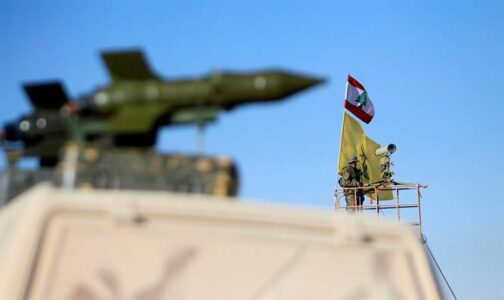
Hezbollah rocket attacks spark fears that war is a matter of time
There are fears of an eruption on Israel’s northern border after Hezbollah admitted firing rockets in to the country for the first time in 15 years.
Some analysts expect things to calm, but others say that with Iran pushing for more clashes, conflict is almost inevitable. Dr Eyal Pinko, a member of the Begin-Sadat Center for Strategic Studies at Bar Ilan University, told the JC: “The question isn’t whether there will be a conflict with Hezbollah but rather when it will be — it’s only a matter of time.”
He added: “Let’s remember that in 2006, the Second Lebanon war started after two cross-border attacks. Soon there was war. It’s the Middle East, and here just one rocket hitting an Israeli city, just one stupid act, can start a war.”
Benny Gantz, Israeli defence minister, toured the border on Tuesday and pointed his finger at Iran, which funds Hezbollah, appealing to world powers to come down hard on the leadership in Tehran.
“We call on the international community to take action and stop Iranian aggression,” he said. “This is the time for joint action.”
Soldiers on the Israel-Lebanon border have been on high alert since last Friday, when Hezbollah launched an aggressive 19-rocket barrage towards the Golan Heights. For the first time since the Second Lebanon War or 2006, Hezbollah took responsibility for the attack.
It followed the launch of three rockets fired at Israel’s most northern city, Kiryat Shmona, two days earlier. One of the rockets had fallen short of the border, while two had come down near a residential area and caused fires.
Hezbollah is widely thought to have carried out this attack but, unlike the other, did not take responsibility.
Israel responded with airstrikes. They constituted the most extensive carried out in recent years over Lebanon and hit dozens of militant targets.
After this retaliation, Hezbollah unleashed its fire on the Golan, which Hezbollah leader Hassan Nasrallah justified by saying he wanted to “send a message, and to take a step, and we can later escalate by another step.”
The Commander of Iran’s Revolutionary Guards Corps, Hossein Salami, met Mr Nasrallah’s deputy Naim Qassem to congratulate him on the fire, according to Iranian media.
“I congratulate Hezbollah on demonstrating wisdom and honour in their handling of the Zionists,” Mr Salami said. “Hezbollah, which was born out of jihad, has made it clear to the Zionist enemy that they are surrounded on all sides.”
Frictions in the region started to rise on 29 July. The fatal attack on an Israeli-owned ship off the coast of Oman is widely blamed on Tehran.
Now, Israel fears that Iran has instructed its proxies in Hezbollah to take advantage of internal unrest in Lebanon to ramp up friction on the border. Scarce fuel supplies in Lebanon are causing high tensions, and this week descended to violence, leaving three men dead. Mr Gantz said: “We are well aware of Hezbollah’s attempts to exploit the situation at the expense of the safety and livelihoods of Lebanese citizens — under the direct influence of Iran.”
He stated that Jerusalem has sympathy for the people of Lebanon. “The crisis in Lebanon is devastating,” he commented. “The State of Israel calls on the international community to aid Lebanon. We are also willing to provide assistance, however we will not enable the tragedy in Lebanon to cross the border into Israel.”
The International response to the incidents infuriated Israel’s ambassador to America and the UN, Gilad Erdan. UN Secretary-General Antonio Guterres resounded to the violence by releasing a statement calling on “all parties to exercise utmost restraint” and saying it is “paramount” that “all actors involved avoid actions that can further heighten tensions and lead to miscalculation.”
Mr Erdan said it was “unfortunate” that Mr Guterres “repeatedly chooses to draw a moral equivalency between attacks perpetrated by designated terrorist organisations and the law-abiding, democratic State of Israel, which is a member of the UN.”
As Jerusalem upped the ante against Iran following the attacks, Israel was working to cement international alliances against it. On Wednesday, Prime Minister Naftali Bennett met CIA Director William Burns in Tel Aviv. According to Mr Bennett’s office, “the two discussed tightening intelligence and security cooperation between Israel and the US, as well as the situation in the Middle East, especially Iran, and possibilities for expanding and deepening regional cooperation.”
Israel is also looking to achieve consensus with new Arab allies on Iran. On Wednesday, Foreign Minister Yair Lapid led the first ministerial delegation to Morocco since the establishment of Jerusalem-Rabat ties in December. Shared concerns about Iran were expected to be central to discussions.
Meanwhile in Israel, after the Hezbollah incidents Israel received strong support from Bahrain, which began normalisation with Israel a year ago. Bahrain’s Undersecretary for International Relations Sheikh Abdullah bin Ahmad al-Khalifa was in Israel this week, and held various meetings, including one with Tal Kelman, the IDF commander who handles responses to the Iranian threat.
During his trip Mr al-Khalifa strongly criticised Iran’s conduct, and spoke out strongly against the idea of a renewed nuclear deal, lambasting the last one in terms that echo the Israeli critique. “In any crisis in the Middle East, we can point to the involvement of Iran and its proxies,” he said. “We want to see Iran stable, secure, prosperous and responsible – and we do not see that. The nuclear deal focused only on the nuclear issue, but ignored other issues that troubled the region: Tehran’s ballistic missiles and aggressive behaviour.”
Source: The JC





